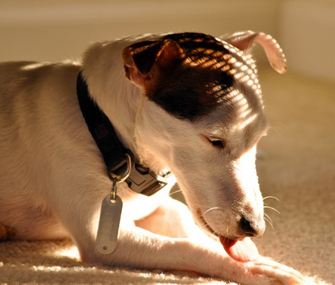
Well for some people licking wounds might be a nasty thing to do. Canine saliva can be helpful in cleaning your wound and even healing it.

Humans dogs as well as other species will desire to quickly attend to their wounds.
Is it good for a dog to lick human wounds. Wound licking is an instinctive response in humans and many other animals to an injury. Dogs cats rodents and primates all lick wounds. There is a common folk belief that animal saliva especially that of Dogs has healing properties for human wounds.
Evidence for this comes from a number of historical traditions. The practice of allowing dogs to heal wounds with licking dates back as far as the Egyptian age where dogs were allowed to lick the open wounds of humans in the belief that their saliva could heal. The following compounds are present in canine saliva and are thought to have antimicrobial and healing properties.
Why do dogs lick human wounds. Humans dogs as well as other species will desire to quickly attend to their wounds. It is an instinct.
When your dog licks a wound there are healing capacities in their saliva and it can also help cleanse the area. Canine saliva can be helpful in cleaning your wound and even healing it. Is dog saliva good.
Although your dog means well when it tries to lick your wounds canine saliva can cause infections in humans. As dog bites carry risk of infection so does licking. It is rare for dog saliva to cause serious injury but it has in more than one case.
Humans dogs as well as other species will desire to quickly attend to their wounds. It is an instinct. When your dog licks a wound there are healing capacities in their saliva and it can also help cleanse the area.
They are natural healers when it comes to grooming and cleaning. It is not only do dogs have a natural instinct to immediately lick any wound inflicted on them. Humans too have a reflex to lick or suck on any cuts they suffer think about the first thing you do when you get a paper cut.
Many mammal species cats rodents horses primates are known to exhibit wound-licking behavior. Wound licking is an instinctive response in humans and many other animals to an injury. Dogs cats rodents and primates all lick wounds.
There is a common folk belief that animal saliva. At the very least the dogs licking cleanses the area. The more a dog licks the more dirt and loose skin will adhere to the saliva on its tongue and be removed from the open sore.
Theres even some anecdotal evidence that a dog licking the wound makes it feel better. Licking wounds is an intuitive behavior done by animal. It is common for us to see cat or dog licking their wounds.
Not only animal human sometimes also have this kind of habit. Unconsciously we bite or lick on our small wound especially those small wounds around the fingers. Well for some people licking wounds might be a nasty thing to do.
Thier is a protein called Nerve Growth Factor NGF in saliva. Wounds doused with NGF healed twice as fast as untreated that is unlicked wounds also dogs mouths carry some antibiotic properties to certain bacteria as well as the physical licking will remove dirt and debris and somewhat clean the wound. It also can be dangerous for individuals with wounds on their bodies.
If your dog places his tongue on a discarded lunch bag on the street he could be opening himself – and you – up to a host of germs and problems including giardia salmonella and toxocara. Home Sweet Home for Bacteria. It really isnt a good idea to let your dog lick your wounds and it really isnt a good idea to let him lick his own.
Despite the suggestion that there may be bactericidal benefits the trauma caused by the friction of licking is destructive to the healing process. A dogs licking may also potentially introduce infection to. A more recent study warns that because of the difference in bacterial flora naturally occurring bacteria in a dogs mouth in comparison to human skin it is not a good idea to allow dogs to lick human wounds for fear of a zoonotic disease resulting.
A good amount of licking can be helpful for small wounds. But remember discourage licking after surgery especially if there are stitches involved dogs are likely to bite and pull them out. A case of too much licking causing skin damage.
Most human infection is generally due to oral contact of hands contaminated by the pets feces or fecal residue. Because pets lick their anus butt these bacteria can also be present in the mouth. Facial and lip licking is a potential route of infection from pet to human.
For wild or feral dogs licking is probably beneficial in cleaning a wound. But wild animals are busy staying safe and finding food whereas a well fed pampered pet can devote a lot of time to licking a wound making it more extensive and sore in the process. So limiting access to wounds particularly surgical ones with stitches is important.